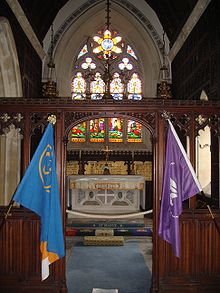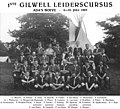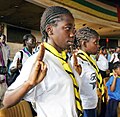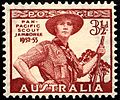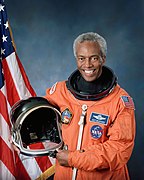The Scouting Portal

Scouting, also known as the Scout Movement, is a worldwide youth social movement employing the Scout method, a program of informal education with an emphasis on practical outdoor activities, including camping, woodcraft, aquatics, hiking, backpacking, and sports. Another widely recognized movement characteristic is the Scout uniform, by intent hiding all differences of social standing in a country and encouraging equality, with neckerchief and campaign hat or comparable headwear. Distinctive uniform insignia include the fleur-de-lis and the trefoil, as well as merit badges and other patches.
In 1907, Robert Baden-Powell, a lieutenant general in the British Army held a Scouting encampment on Brownsea Island in England. Baden-Powell wrote Scouting for Boys (London, 1908), partly based on his earlier military books. The Scout Movement of both Boy Scouts and Girl Guides (renamed to Girl Scouts in some countries) was well established in the first decade of the twentieth century. Later, programs for younger children, such as Wolf Cubs (1916), now Cubs, and for older adolescents, such as Rovers (1918), were adopted by some Scout organizations. In 1910, Baden-Powell formed the Girl Guides, for girls in the United Kingdom which spread internationally as Girl Guides and includes age programs of (Brownie Guide, Girl Guide and Girl Scout, Ranger Guide).
In 2007, Scouting and Guiding together had over 38 million members in 216 countries. International umbrella organizations include: World Organization of the Scout Movement (WOSM), for boys-only and co-educational organizations: World Association of Girl Guides and Girl Scouts (WAGGGS), primarily for girls-only organizations but also accepting co-educational organizations, World Federation of Independent Scouts, World Organization of Independent Scouts, Order of World Scouts, International Union of Guides and Scouts of Europe, and Confederation of European Scouts. (Full article...)
Selected article -
Religion in Scouting and Guiding is an aspect of the Scout method that has been practiced differently and given different interpretations in different parts of the world over the years.
In contrast to the Christian-only Boys' Brigade, which started two decades earlier, Robert Baden-Powell founded the Scout movement as a youth organization (with boys as 'Scouts' and girls as 'Guides'), which was independent of any single faith or religion, yet still held that spirituality and a belief in a higher power were key to the development of young people. (Full article...)
Selected picture
Did you know
- ...that Eagle Scout is also the highest rank in the Boy Scouts of the Philippines, not only the Boy Scouts of America?
- ...that King Carl XVI Gustaf of Sweden attended the 1981 National Jamboree at Fort A. P. Hill, Virginia, USA?
- ...that Owasippe Scout Reservation is the oldest continuously operating Boy Scout camp in America?
- ...Scouting in Germany consists of more than 130 different associations and federations with about 250,000 Scouts and Guides?
- ...that "Knight Scout" is the Danish equivalent of BSA's Eagle Scout rank?
Related portals
WikiProjects
Selected biography -
László Adolf Ede György Mária Almásy de Zsadány et Törökszentmiklós (Hungarian: zsadányi és törökszentmiklósi Almásy László Adolf Ede György Mária; pronounced [ˈɒlmaːʃi ˈlaːsloː ˈɛdɛ]; 22 August/3 November 1895 – 22 March 1951) was a Hungarian aristocrat, motorist, desert explorer, aviator, Scout-leader, and sportsman who served as the basis for the protagonist in both Michael Ondaatje's novel The English Patient (1992) and the movie adaptation of the same name (1996). (Full article...)
Selected anniversaries - November
9th
- 1992 – William "Green Bar Bill" Hillcourt, the father of American Scouting, dies in Europe.
30th
- 1941 – Formation of the clandestine Girl Scouts group called Mury in the Ravensbrück concentration camp
General images
Scouting by region
World Organization of the Scout Movement:
- Africa Scout Region
- Arab Scout Region
- Asia-Pacific Scout Region
- Eurasian Scout Region
- European Scout Region
- Interamerican Scout Region
World Association of Girl Guides and Girl Scouts:
Topics
Scouting lists
- Age groups in Scouting and Guiding
- List of highest awards in Scouting
- List of notable Eagle Scouts
- List of famous Scouts
- List of Order of the Arrow national events
- List of Scouting memorials
- List of Scouting museums
- List of World Association of Girl Guides and Girl Scouts members
- List of World Organization of the Scout Movement members
- Merit badge (Boy Scouts of America)
Subcategories

Recognized content
| This is a list of recognized content, updated weekly by JL-Bot (talk · contribs) (typically on Saturdays). There is no need to edit the list yourself. If an article is missing from the list, make sure it is tagged (e.g. {{WikiProject Scouting}}) or categorized correctly and wait for the next update. See WP:RECOG for configuration options. |
Featured articles
Former featured articles
 Baden-Powell House
Baden-Powell House Robert Baden-Powell, 1st Baron Baden-Powell
Robert Baden-Powell, 1st Baron Baden-Powell Boy Scouts of America membership controversies
Boy Scouts of America membership controversies Brownsea Island Scout camp
Brownsea Island Scout camp Frederick Russell Burnham
Frederick Russell Burnham Eagle Scout
Eagle Scout Gerald Ford
Gerald Ford Gilwell Park
Gilwell Park Girl Scouts of the USA
Girl Scouts of the USA History of merit badges (Boy Scouts of America)
History of merit badges (Boy Scouts of America) L. Ron Hubbard
L. Ron Hubbard Mackinac Island
Mackinac Island Witold Pilecki
Witold Pilecki Franklin D. Roosevelt
Franklin D. Roosevelt Terry Sanford
Terry Sanford Scout Association of Hong Kong
Scout Association of Hong Kong Scouting
Scouting
Main page featured articles
- Buzz Aldrin (2020-01-20)
- Neil Armstrong (2019-07-21)
- Baden-Powell House (2020-02-08)
- Robert Baden-Powell, 1st Baron Baden-Powell (2007-08-01)
- Boy Scouts of America membership controversies (2009-09-26)
- William D. Boyce (2009-06-16)
- Brownsea Island Scout camp (2020-08-01)
- Frederick Russell Burnham (2012-02-09)
- Roger B. Chaffee (2020-02-15)
- Charles Duke (2021-10-03)
- Eagle Scout (2006-11-14)
- Elizabeth II (2012-06-02)
- Gerald Ford (2006-05-06)
- Gilwell Park (2007-05-04)
- Girl Scouts of the USA (2007-10-29)
- E. Urner Goodman (2008-03-28)
- William Hanna (2010-07-14)
- William Hillcourt (2010-08-06)
- History of merit badges (Boy Scouts of America) (2006-02-22)
- Lou Henry Hoover (2024-03-29)
- L. Ron Hubbard (2011-03-13)
- Jim Lovell (2023-03-25)
- Mackinac Island (2010-05-20)
- Witold Pilecki (2005-01-24)
- Franklin D. Roosevelt (2006-10-13)
- Terry Sanford (2010-08-08)
- David Scott (2022-06-06)
- Scout Association of Hong Kong (2010-12-13)
- Scouting (2007-02-06)
- Wood Badge (2007-09-18)
Good articles
 The Adventures of Totor
The Adventures of Totor Henry Allingham
Henry Allingham William Anders
William Anders David Archuleta
David Archuleta Béla H. Bánáthy
Béla H. Bánáthy Bill Bradley
Bill Bradley Stephen Breyer
Stephen Breyer Frederick Russell Burnham
Frederick Russell Burnham Gene Cernan
Gene Cernan George Thomas Coker
George Thomas Coker Gordon Cooper
Gordon Cooper Merian C. Cooper
Merian C. Cooper Early life of David Lynch
Early life of David Lynch Arthur Rose Eldred
Arthur Rose Eldred Hergé
Hergé James Jabara
James Jabara The Jungle Book
The Jungle Book William H. Keeler
William H. Keeler Thomas S. Monson
Thomas S. Monson North-West Mounted Police
North-West Mounted Police Order of the Arrow
Order of the Arrow Ross Perot
Ross Perot Witold Pilecki
Witold Pilecki Frederick Reines
Frederick Reines Franklin D. Roosevelt
Franklin D. Roosevelt Terry Sanford
Terry Sanford Wally Schirra
Wally Schirra Raymond P. Shafer
Raymond P. Shafer Wood Badge (Boy Scouts of America)
Wood Badge (Boy Scouts of America)
Former good articles
Featured lists
Main page featured lists
- List of Eagle Scouts (2012-08-20)
- List of Boy Scout calendar illustrations (2021-02-08)
Featured pictures
-
Buzz Aldrin
-
Guion Bluford
-
Gumdrop Meets Spider - GPN-2000-001100
-
Maresuke Nogi, 近世名士写真 其1 - Photo only
-
Roger B. Chaffee at a console in the Mission Control Center, Houston, during the Gemini-Titan 3 flight
Picture of the day pictures
-
Buzz Aldrin (2022-07-21)
-
Guion Bluford (2019-11-22)
-
Gumdrop Meets Spider - GPN-2000-001100 (2025-03-03)
-
Maresuke Nogi, 近世名士写真 其1 - Photo only (2020-09-13)
-
Roger B. Chaffee at a console in the Mission Control Center, Houston, during the Gemini-Titan 3 flight (2021-03-23)
Did you know? articles
 1st World Scout Jamboree (2006-09-16)
1st World Scout Jamboree (2006-09-16) 3rd World Scout Jamboree (2006-09-22)
3rd World Scout Jamboree (2006-09-22) 50-Miler Award (2006-03-23)
50-Miler Award (2006-03-23) Irena Adamowicz (2008-08-27)
Irena Adamowicz (2008-08-27) Buzz Aldrin (2018-12-23)
Buzz Aldrin (2018-12-23) William Anders (2022-10-01)
William Anders (2022-10-01) Béla H. Bánáthy (2008-09-24)
Béla H. Bánáthy (2008-09-24) Harry Brinkley Bass (2006-09-30)
Harry Brinkley Bass (2006-09-30) Daniel Carter Beard Boyhood Home (2008-05-08)
Daniel Carter Beard Boyhood Home (2008-05-08) Ion Biberi (2023-10-29)
Ion Biberi (2023-10-29) Black Cap Mountain (2020-06-02)
Black Cap Mountain (2020-06-02) Boy Rangers of America (2008-01-04)
Boy Rangers of America (2008-01-04) Brownsea Island Scout camp (2006-07-12)
Brownsea Island Scout camp (2006-07-12) Russell Adam Burnham (2007-10-16)
Russell Adam Burnham (2007-10-16) Camp Paxson Boy Scout Camp (2012-06-03)
Camp Paxson Boy Scout Camp (2012-06-03) Camp Pico Blanco (2009-11-20)
Camp Pico Blanco (2009-11-20) Campfire ash ceremony (2020-08-11)
Campfire ash ceremony (2020-08-11) Carlton Colville Scouts Memorial (2024-11-11)
Carlton Colville Scouts Memorial (2024-11-11) Roger B. Chaffee (2019-07-17)
Roger B. Chaffee (2019-07-17) Anne Hyde Choate (2007-04-26)
Anne Hyde Choate (2007-04-26) George Thomas Coker (2006-01-10)
George Thomas Coker (2006-01-10) Gordon Cooper (2019-03-09)
Gordon Cooper (2019-03-09) Merian C. Cooper (2016-12-08)
Merian C. Cooper (2016-12-08) Cornwell Scout Badge (2014-02-16)
Cornwell Scout Badge (2014-02-16) Charles Duke (2020-01-09)
Charles Duke (2020-01-09) Duty to God Award (2008-08-22)
Duty to God Award (2008-08-22) Early life of David Lynch (2012-09-25)
Early life of David Lynch (2012-09-25) Arthur Rose Eldred (2006-01-19)
Arthur Rose Eldred (2006-01-19) Elizabeth II (2006-04-02)
Elizabeth II (2006-04-02) Fadjar Harapan (2011-01-05)
Fadjar Harapan (2011-01-05) Ferenc Farkas de Kisbarnak (2008-12-27)
Ferenc Farkas de Kisbarnak (2008-12-27) Tom Foley (2004-06-24)
Tom Foley (2004-06-24) Gilwell Oak (2018-03-04)
Gilwell Oak (2018-03-04) Ging Gang Goolie (2006-11-24)
Ging Gang Goolie (2006-11-24) Girl Scout National Center West (2010-10-12)
Girl Scout National Center West (2010-10-12) Grey Ranks (2005-01-27)
Grey Ranks (2005-01-27) Growth of a Leader (2015-01-28)
Growth of a Leader (2015-01-28) Józef Haller (2008-01-26)
Józef Haller (2008-01-26) William G. Higgs (2010-08-29)
William G. Higgs (2010-08-29) Historic Trails Award (2010-07-10)
Historic Trails Award (2010-07-10) Josephine Groves Holloway (2019-08-04)
Josephine Groves Holloway (2019-08-04) Lou Henry Hoover (2023-01-23)
Lou Henry Hoover (2023-01-23) James G. Howes (2010-06-22)
James G. Howes (2010-06-22) Humshaugh (2007-02-02)
Humshaugh (2007-02-02) Nicolae Iorga (2011-05-23)
Nicolae Iorga (2011-05-23) Ivančena (2024-05-14)
Ivančena (2024-05-14) John Work House and Mill Site (2006-09-05)
John Work House and Mill Site (2006-09-05) Eva Julius (2022-06-25)
Eva Julius (2022-06-25) Valdemārs Klētnieks (2020-09-16)
Valdemārs Klētnieks (2020-09-16) Koshare Indian Museum and Dancers (2009-12-08)
Koshare Indian Museum and Dancers (2009-12-08) Len Lanzi (2020-09-20)
Len Lanzi (2020-09-20) Wilbert E. Longfellow (2022-07-05)
Wilbert E. Longfellow (2022-07-05) Jim Lovell (2021-10-20)
Jim Lovell (2021-10-20) Mafeking Cadet Corps (2006-05-12)
Mafeking Cadet Corps (2006-05-12) Sanford N. McDonnell (2006-03-21)
Sanford N. McDonnell (2006-03-21) Ellie Morrison (2019-11-29)
Ellie Morrison (2019-11-29) Mounted Boy Scout Troop 290 (2012-04-24)
Mounted Boy Scout Troop 290 (2012-04-24) 2010 National Scout Jamboree (2010-08-20)
2010 National Scout Jamboree (2010-08-20) Nkwenkwe Nkomo (2008-10-14)
Nkwenkwe Nkomo (2008-10-14) Outlaw Trail: The Treasure of Butch Cassidy (2009-05-29)
Outlaw Trail: The Treasure of Butch Cassidy (2009-05-29) Owasippe Scout Reservation (2006-02-02)
Owasippe Scout Reservation (2006-02-02) Oleg Pantyukhov (2006-12-13)
Oleg Pantyukhov (2006-12-13) Margrethe Parm (2022-07-30)
Margrethe Parm (2022-07-30) Sir Arthur Pearson, 1st Baronet (2005-12-12)
Sir Arthur Pearson, 1st Baronet (2005-12-12) Ross Perot (2020-05-13)
Ross Perot (2020-05-13) Robert W. Peterson (writer) (2008-06-11)
Robert W. Peterson (writer) (2008-06-11) Witold Pilecki (2022-03-04)
Witold Pilecki (2022-03-04) Polish Scouting and Guiding Association (2004-08-06)
Polish Scouting and Guiding Association (2004-08-06) Catherine Pollard (Scouting) (2010-07-12)
Catherine Pollard (Scouting) (2010-07-12) Quartermaster Award (Boy Scouts of America) (2009-06-27)
Quartermaster Award (Boy Scouts of America) (2009-06-27) Oluf Reed-Olsen (2010-04-04)
Oluf Reed-Olsen (2010-04-04) Frederick Reines (2015-03-19)
Frederick Reines (2015-03-19) Religion in Scouting (2006-12-04)
Religion in Scouting (2006-12-04) Resica Falls Scout Reservation (2006-08-17)
Resica Falls Scout Reservation (2006-08-17) Edward L. Rowan (2010-07-19)
Edward L. Rowan (2010-07-19) Carl Rungius (2008-08-18)
Carl Rungius (2008-08-18) Izabela Sadoveanu-Evan (2011-05-25)
Izabela Sadoveanu-Evan (2011-05-25) Terry Sanford (2022-06-20)
Terry Sanford (2022-06-20) Faisal bin Abdullah Al Saud (born 1950) (2012-05-23)
Faisal bin Abdullah Al Saud (born 1950) (2012-05-23) Wally Schirra (2018-10-03)
Wally Schirra (2018-10-03) David Scott (2019-07-21)
David Scott (2019-07-21) Scout councils (Boy Scouts of America) (2013-03-16)
Scout councils (Boy Scouts of America) (2013-03-16) Scouter's Key Award (2010-09-10)
Scouter's Key Award (2010-09-10) Scouter's Training Award (2010-09-07)
Scouter's Training Award (2010-09-07) Scouting in displaced persons camps (2007-11-07)
Scouting in displaced persons camps (2007-11-07) Scouting/USA (2018-03-06)
Scouting/USA (2018-03-06) Scouting and Guiding in Saskatchewan (2009-03-28)
Scouting and Guiding in Saskatchewan (2009-03-28) The Scoutmaster (2014-06-15)
The Scoutmaster (2014-06-15) Scouts' Day (2006-10-10)
Scouts' Day (2006-10-10) Silver Fish Award (2006-09-30)
Silver Fish Award (2006-09-30) Silver Knapsack Trail (2010-11-02)
Silver Knapsack Trail (2010-11-02) Bolton Smith (2022-05-28)
Bolton Smith (2022-05-28) Squirrel Scouts (The Scout Association) (2021-10-04)
Squirrel Scouts (The Scout Association) (2021-10-04) Statue of Liberty (Seattle) (2018-11-08)
Statue of Liberty (Seattle) (2018-11-08) Strengthen the Arm of Liberty (2008-11-11)
Strengthen the Arm of Liberty (2008-11-11) Sturmtrupp-Pfadfinder (2008-01-10)
Sturmtrupp-Pfadfinder (2008-01-10) Unami Lodge (2007-05-29)
Unami Lodge (2007-05-29) Valley Forge Pilgrimage (2006-10-30)
Valley Forge Pilgrimage (2006-10-30) William Verbeck (2020-01-10)
William Verbeck (2020-01-10) Vermejo Park Ranch (2008-02-19)
Vermejo Park Ranch (2008-02-19) Frank H. Wadsworth (2022-07-07)
Frank H. Wadsworth (2022-07-07) We, Too, Have a Job to Do (2016-01-04)
We, Too, Have a Job to Do (2016-01-04) Ye Htoon (2006-12-15)
Ye Htoon (2006-12-15)
In the News articles
 Henry Allingham (2009-04-01)
Henry Allingham (2009-04-01) William Anders (2024-06-10)
William Anders (2024-06-10) Neil Armstrong (2012-08-25)
Neil Armstrong (2012-08-25) Stephen Bechtel Jr. (2021-03-17)
Stephen Bechtel Jr. (2021-03-17) Gene Cernan (2017-01-18)
Gene Cernan (2017-01-18) Elizabeth II (2015-09-09)
Elizabeth II (2015-09-09) Tom Foley (2013-10-18)
Tom Foley (2013-10-18) Juan Carlos I (2014-06-03)
Juan Carlos I (2014-06-03) William H. Keeler (2017-03-26)
William H. Keeler (2017-03-26) Little Sioux Scout Ranch (2008-06-12)
Little Sioux Scout Ranch (2008-06-12) Charles McGee (pilot) (2022-01-17)
Charles McGee (pilot) (2022-01-17) Thomas S. Monson (2018-01-03)
Thomas S. Monson (2018-01-03) Ross Perot (2019-07-11)
Ross Perot (2019-07-11) Debbie Reynolds (2016-12-29)
Debbie Reynolds (2016-12-29)
Associated Wikimedia
The following Wikimedia Foundation sister projects provide more on this subject:
-
Commons
Free media repository -
Wikibooks
Free textbooks and manuals -
Wikidata
Free knowledge base -
Wikinews
Free-content news -
Wikiquote
Collection of quotations -
Wikisource
Free-content library -
Wikiversity
Free learning tools -
Wiktionary
Dictionary and thesaurus
